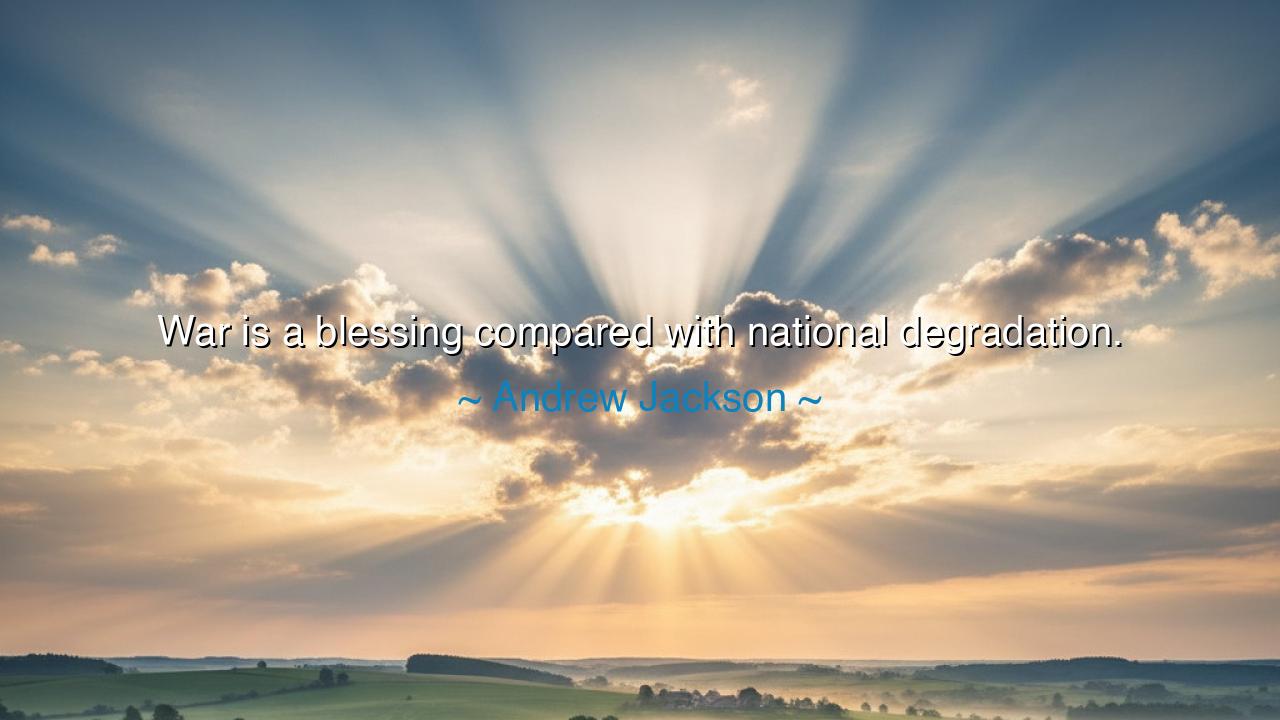
War is a blessing compared with national degradation.






Hearken, O child of the future, to the words of Andrew Jackson, who thundered with the voice of his age: “War is a blessing compared with national degradation.” Though the clang of arms is fierce and the rivers of blood are bitter, yet he saw in the crucible of battle a nobility that could never be found in cowardly decay. For Jackson, the march of armies was not merely destruction, but the fire that kept alive the spirit of a people. To live under degradation, dishonored, stripped of dignity and enslaved in spirit, was a curse far darker than the drums of war.
Consider the heart of the saying. War, dreadful as it is, demands courage, unity, and sacrifice. It calls forth the strong and awakens the sleeping valor in men’s souls. National degradation, by contrast, is slow poison. It seeps into the bones of a people; it dulls their honor, rots their institutions, and makes them servile before foreign masters or corrupt tyrants. Jackson, a soldier hardened by the storms of his era, knew that nations may recover from wounds, but they rarely rise again once their spirit has been broken.
Recall, for instance, the fate of Greece under Persian threat. The Greeks, facing the vast hosts of Xerxes, could have chosen submission. They could have bent the knee, paying tribute, and lived in the shame of subjugation. Yet they chose war—terrible war, where cities were burned and fields laid waste. But from their sacrifice arose the glory of Salamis and Plataea, victories that secured for generations the freedom of their civilization. The Greeks endured war, but they rejected degradation, and so preserved the flame of their culture for the ages.
Or think upon Jackson’s own field—the Battle of New Orleans. The British sought to shackle the young republic once more, to reduce it to a vassal of the crown. In that hour, Jackson and his ragged force stood against the mightiest army of their day. Victory was not only a triumph of arms but of spirit. Had the Americans yielded, had they cowered before Britain’s might, the republic’s soul would have withered. But through battle, they declared to the world that they would not sink into the dust of national degradation.
What, then, is the lesson for us who dwell in quieter times? It is this: better to strive, even in hardship, than to surrender dignity for ease. For nations and for individuals alike, the death of honor is the death of the soul. To accept corruption, injustice, or humiliation in the name of comfort is to invite a deeper ruin than war itself. Courage, though it brings wounds, guards the spirit; cowardice, though it brings safety, enslaves it.
Therefore, O hearer, cultivate in yourself the spirit that Jackson praised. Do not fear the struggle, whether it be against injustice in the land, corruption in leadership, or weakness within your own heart. War may not always be of muskets and cannon; sometimes it is the inner battle against apathy, against despair, against submission to the lesser path. Fight these wars, for they are blessings, and they will preserve your dignity.
Take practical steps, then: speak the truth even when silence is easier; defend the weak even when power threatens you; stand firm in principle even when temptation whispers. Refuse to barter away honor for fleeting gain. Better the wounds of battle than the chains of dishonor. For as Andrew Jackson taught, and as the ancients lived, war is a blessing compared with national degradation—because the fire of struggle keeps alive the light of freedom, while the rot of surrender extinguishes it forever.






VTVinh Tran
Jackson’s quote strikes me as a harsh but possibly understandable sentiment in the context of his time. When a nation faces the possibility of losing its identity or sovereignty, perhaps war seems like the only option to preserve it. But is war really the best option? Aren’t there countless examples of nations that have overcome crises through peaceful means or moral leadership? This quote makes me wonder if we still apply such drastic thinking in modern times.
PCphong chau
While Jackson’s quote may hold weight in a historical context, I find myself questioning whether war should ever be seen as a ‘blessing’. The pain, destruction, and division caused by war can be profound, and it often leads to long-lasting consequences that go beyond national pride. Is there not another way to fight degradation, such as through diplomacy, resilience, or reform, without resorting to the horrors of war?
TLtri lee
Jackson’s quote is powerful, but it raises difficult questions. Can we truly equate war with a ‘blessing’? What does he mean by ‘national degradation’? Could it be that the devastation of war might seem preferable to losing a nation’s honor, but what about the lasting damage that war causes? Perhaps the bigger question here is whether we, as a society, have ever truly found a balance between the two extremes of war and degradation.
MTMan Tango
Andrew Jackson’s quote seems to suggest that national dignity is more important than avoiding war at all costs. But can war really be seen as a ‘blessing’? What if the consequences of war, such as loss of life and long-term trauma, outweigh the potential benefits of preserving national pride or power? I understand the sentiment, but I feel that it oversimplifies the complex choices governments face when confronted with national degradation.